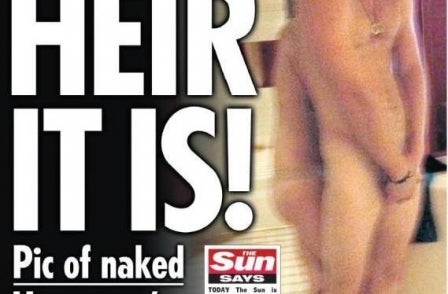
The Sun today defied legal warnings from Clarence House issued via the PCC to run the Prince Harry naked party photos.
The Sun's public interest argument, explained on pages four and five, states that the fact the photos have been published by dozens of websites around the world puts them "indisputably in the public domain".
Royal lawyers Harbottle and Lewis argued that the prince had a "reasonable expectation of privacy" in a private hotel suite.
But The Sun argued today that the publication of the pictures online "generated a legitimate public debate about the behaviour of the man who is third in line to the throne and is increasingly taking on official duties, as he did most recently at the Olympics' closing ceremony.
"Yet as the debate went on in homes, factories, offices and pubs, the press were still banned from using the pictures.
"The millions of people who get their news in print, or have no web access, could not take a full part in the national conversation because they could not see the images..
"The Royal Family's lawyers claim there's no public interest in The Sun running the photos. This is a favourite mantra of those who wish to muzzle the world's most vibrant newspapers, here in Britain – stuffily declaring that a story has no 'public interest', as though it were unassailable fact.
"But there is a clear public interest in publishing the Harry pictures, in order for the debate around them to be fully informed. The photos have potential impications for the Prince's image representing Britain around the world."
The Sun also argued that the photos raised security concerns and that Harry had compromised his own privacy by "inviting strangers to his hotel room for a game of strip billiards".
"These are hardly the acts of a man jealously guarding his privacy", the paper notes.
The Sun also argued that publication of the photos was justified under the Press Complaints Commission Editors' Code of Practice, citing a 2010 ruling involving Loaded magazine.
In that case, Loaded ran a piece headlined "Wanted: epic boobs woman" in which it published photos which a woman uploaded to her Bebo social networking site four years earlier when she was 15.
In that case the PCC said: "The Commission felt that the images were so widely established for it to be untenable for the Commission to rule that it was wrong for the magazine to use them."
The Sun said: "It is absurd tthat in the internet age newspapers like The Sun could be stopped from publishing stories and pictures already seen by millions in the free-for-all that is the web."
The Sun said it has asked the PCC to explain how the Harry case differs from the 2010 Loaded decision.
This week the PCC has been offering publications pre-publication advice on whether to publish the Harry photos. But it told Press Gazette that it was never prescriptive, it merely offered editors guidance on the code with reference to different rulings.
Email pged@pressgazette.co.uk to point out mistakes, provide story tips or send in a letter for publication on our "Letters Page" blog

